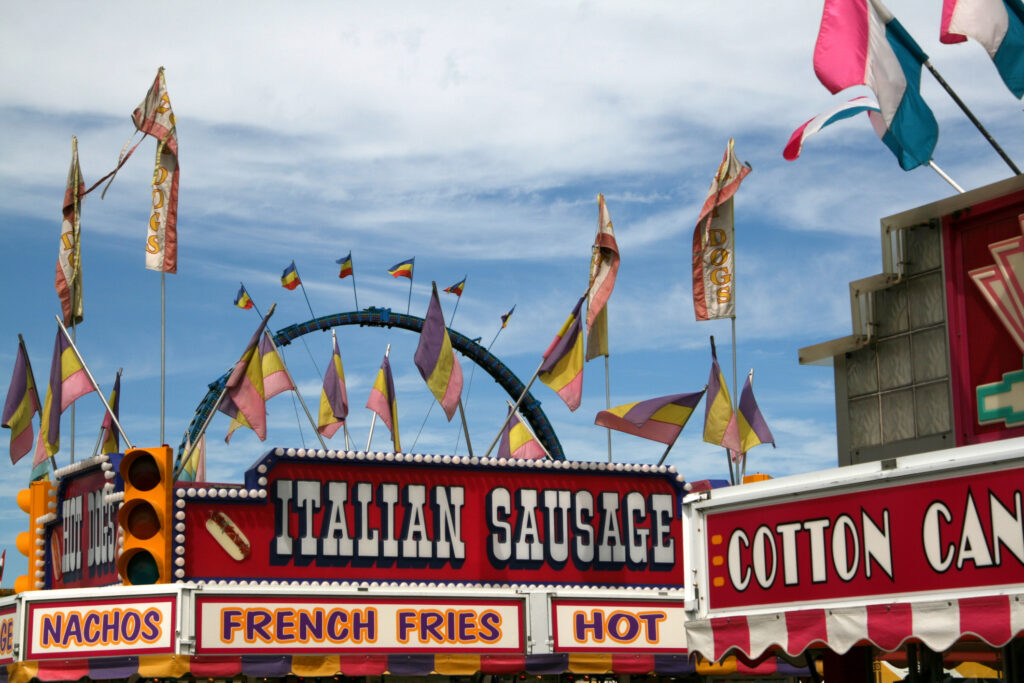No carnival, festival, state fair, or theme park is complete without food concessions. Whether it’s the corn dog stand, cotton candy, or a unique theme-based concession stand, guests love and look forward to food concessions. There are several considerations concessionaires should make before adding amusement food concessions.
One of the most significant considerations to make about food concessions is food safety. Food safety involves:
- Staying in compliance with local laws and regulations.
- Creating a food safety plan.
- Training staff.
The main components of starting a food concession business include a business plan, business structure, and financing.
Food concessions & concessionaires: risk management
Food safety
Before you can mitigate risk, you need to identify it. The most significant trouble with a concession stand is food. Purchase food from trusted and high-quality sources. Never purchase food that’s past its expiration date.
Refrigerated food should always be cold to the touch, frozen food should be hard, and food packaging should not have cracks, dents, tears, or bulges. The transportation of the food you buy is equally important. Cold food should be delivered in refrigerated vehicles or packed properly to maintain temperatures during transport.
The second component of risk with food is food handling. This pertains to the people handling the food once delivered. Staff preparing food and staff serving food are considered handlers.
Improper handling is the biggest contamination risk. Some of the essential mitigation practices for food handlers include:
- Food handlers need to wash hands with warm water and soap before handling food, even when wearing protective gloves.
- Change gloves after every hand washing.
- Food handlers should not be around food if they have any illness symptoms like coughing, sniffling, sneezing, fever, etc.
- Wear proper hats and hairnets.
- Never touch food with bare hands.
- Always use an ice scoop instead of bare hands to dispense ice for drinks.
Liquor liability
Food concessions serving alcohol can be held liable for incidents involving intoxicated guests. Concessionaires selling alcohol should be trained in proper alcohol service. Some states require specific training to serve alcohol. Training helps servers detect intoxication signs and teaches them how to refuse service and handle intoxicated patrons.
Liquor liability insurance is a must for food concessions serving alcohol as it can pay for legal expenses arising from alcohol-related claims.
Property & equipment
Maintaining property and equipment is a critical component of food concession risk management. Whether your concession stand is attached to a building or a detached mobile stand, proper maintenance reduces guest or staff chances of getting injured.
- Keep a clean kitchen by handling grease properly and storing equipment like sharp knives safely.
- Always mop up spills immediately. Use caution cones to identify wet spots that are in the process of drying.
- Make walking paths clear of obstacles that can cause trips and falls like extension cords.
- Regularly inspect refrigerators and freezers. Refrigeration units that malfunction can quickly ruin thousands of dollars in product.
- Heating equipment can lead to fires if left unchecked. At the first sign of a malfunction, have heating equipment like heat lamps, ranges, and stoves inspected by a professional.
Basic concessionaire’s insurance coverages
Even when you do everything right, bad things can still happen. Adding a final layer of protection with the right type of insurance can make all the difference between sinking and swimming when the unexpected happens. Concessionaires have many different types of insurance they should consider.
- General Liability — General liability insurance is often the first policy concession stand owners to purchase. It protects against lawsuits, accidents, and oversights. It’s also a requirement for most commercial leases.
- Commercial Automobile Insurance – This coverage is designed to protect your company from liability associated with the use of motor vehicles for your business. It also provides coverage for Physical Damage should you wish to protect your vehicles. Coverage may also be extended to vehicles you rent, borrow, or are otherwise covered as personally-owned autos.
- Commercial Inland Marine Insurance — This type of insurance covers a businesses’ mobile equipment and stock. It helps pay for replacement when business property is lost, damaged, or destroyed. It can cover natural disasters and equipment breakdowns.
- Seasonal Business Insurance — A special type of coverage add-on for businesses that are only open for a few weeks or months of the year. Seasonal insurance can protect special events that get canceled, pop-up shops that lease your space, unexpected event loss from weather damage, and losses from a weaker than expected season.
- Excess Liability Coverage — Provides excess limits of liability over your primary Commercial General Liability, Commercial Automobile Liability, and Employers Liability. Limits are available up to $25,000,000 or higher as necessary.
- Workers’ Compensation Insurance – Workers’ compensation insurance is meant to provide the sole remedy for workplace-related injuries and illness. Workers’ compensation coverage is statutorily mandated.
McGowan Allied Specialty Insurance specializes in Amusement and Entertainment Insurance. We have over 35 years of experience insuring amusement parks, waterparks, carnivals, fairs, festivals, and other entertainment venues.
